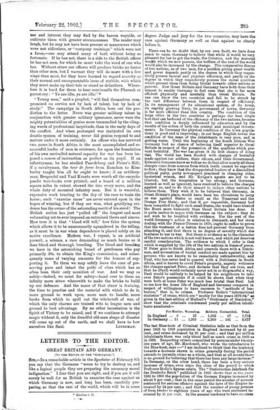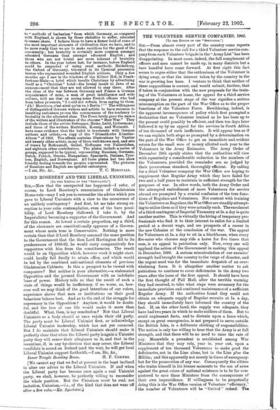LETTERS TO THE EDITOR.
GREAT BRITAIN AND GERMANY.
[TO THE EDITOR OF THE "SPECTATOR:]
• Exodus v. 17.
Sra,—In a remarkable article in the Spectator of February 8th you say that the Germans "mean to try to destroy US, and like a logical people they. are preparing the necessary moral indignation." I fear that you are right, and if you are it will surely be well for us British to examine die case against us which Germany is now, and long has been, carefully pre- paring, so that the rest of the world, which will be in some
degree Judge and jury for the two countries, may have the case against Germany as well as that against us clearly before it.
There can be no doubt that, by our own fault, we have done much to cause Germany to believe that while it would be very pleasant for her to get the trade, the Colonies, and the material wealth which we now possess, the welfare of the rest of the world would also be increased by the change. The comparative fitness of two nations, as of two men, for a position giving great wealth and power depends partly on the degree in which they respec- tively possess mental and physical efficiency, and partly on the degree in which they respectively possess the moral qualities which prevent them from being brutal towards other nations or persons. Now Great Britain and Germany have both done their utmost to enable Germany to feel sure that she is far more efficient physically and mentally than Great Britain. No one can know the two countries and fail to be struck by the vast differenc,e between them in respect of efficiency. In its management of its educational system, of its Army, its rapidly growing Navy, its government of towns, Germany is far more efficient than this country. The condition of the large cities in the two countries is perhaps the best single test that can be found of the efficiency of the two nations, because that condition is deeply influenced by education and by the results of the action of both the central and municipal Govern- ments. In Germany the physical condition of the town popula- tions is good and is improving ; in our large English towns the condition of the mass of the inhabitants is very poor, and is getting worse. Until the beginning of the South African War Germany had no chance of believing itself superior to Great Britain in respect of the possession of the qualities which, pre- vent brutality. The war has given it its first chance of doing this. The world has been flooded with charges of brutality made against our soldiers, their officers, and their Government. Educated Germane know as well as we do that all or nearly all these charges come from sources from which truth cannot be expected to flow; they know that the disappointed leaders of a discredited political party, party newspapers practised in changing sides, hysterical women, and Mr. RrUger's agents are not to be trusted; but the temptation is too strong; and Germans, learned as well as ignorant, have resolved to believe the charges against us, and to do their utmost to induce other nations to believe them. They wish it to be believed that Germany, in Great Britain's place, would have been too chivalrous to carry on war against States so small as the Transvaal and the Orange Free State; and that if, per impossibile, Germany had been compelled to fight such small States, she would have treated the Boers more humanely than Great Britain has done. It is quite useless to argue with Germane on the subject : they do not wish to be troubled with evidence. For the rest of the world Germany's action in relation to Denmark, and her stern dealing with the Francs-Tireurs in 1870, ought to suffice to prove that the weakness of a nation does not prevent Germany from attacking it, and that there is no degree of severity which she hesitates to use in war. But there is evidence as to the character of the two nations which is not well known, and which yet deserves careful consideration. The evidence to which I refer is that which is supplied by the life of the two nations in times of peace. If Peter goes to South Africa and quarrels there with a Dutch- man, and accusations of brutal conduct are made against him by persons who are known to be remarkably untrustworthy, and Paul, who has never had to quarrel with a Dutchman in South Africa, and is known to covet Peter's property, eagerly welcomes the charges against Peter, and declares that they are true, and that he (Paul) would certainly never act in so disgraceful a way, Paul would be unlikely to be helped by his neighbours to take over Peter's possessions if it could be shown that when they were both at home Peter was much less brutal than Paul. Let us see how the home life of England and Germany compares in respect of willingness to have recourse to "methods of bar. bariem," that is, to crimes. Professor Bodio's "international statistics" of crime, which are " mostly for the years 1876-84," as given in the last edition of Mulhall's "Dictionary of Statistics," show that the criminals condemned yearly per million inhabi- tants numbered—
For Murder. Wounding. Robbery. Unclassified. Total.
In England ... 6 ... 27 ... 1,665 ... 17 ... 1,716 In Germany ... 11 ... 1,265 ... 2,260 ... 141 ... 8,677
The last Blue3ook of Criminal Statistics tells us that from the year 1868 to 1899 population in England increased by 45 per cent, and crime decreased by 25 per cent. ; and that per million inhabitants there was only about half as much crime in 1899 as in 1868. Respecting crimes committed by persons under twenty- one years of age, Mr. Blacdonell, who wrote the introduction to the Blue-book, says :—" I am inclined to think that the tendency towards a decrease shown in crime generally during the period extends to juvenile crime as a whole, and that at all events there is no ground for believing that there has been any large increase." In Germany, on the other hand, there has been a very serious increase of crime, even since the close of the period to which Professor Bodio's figures relate. The " Statistisches Jahrbuoh ffir des Deutsche Reich" published in 1895 shows that in the years 1882 to 1893 the population of the German Empire increased by about 9 percent; that in the same period the number of persons sentenced for serious offences against the laws of the Empire in- creased by 34 per cent. ; and that the number of young persons of from twelve to eighteen years of age who were sentenoed in- creased by 41 per cent. In the greater tendency to have recourse
to" methods of barbarism" from which Germany, as compared with England, is shown by these statistics to suffer, educated Germans share. I believe them to have a firmer hold of some of the most important elements of civilisation than we have, and to be more ready than we are to make sacrifices for the good of the community ; but brutality is certainly more common amongst educated Germans than amongst educated English ; and those who are not brutal are more tolerant of brutality in others. In the year before last, for instance, before England could be suspected of using cruel methods, Heidelberg, the Oxford of Germany, tolerated in its Carnival procession brutes who represented wounded English soldiers. Only a few months ago I saw in the windows of the Kfilner Hof, in Frank- furt-am-Main--a hotel which insults Christians by advertising itself as a " Christian " hotel—the brutal insult to Jews of an announcement that they are not allowed to stay there. After the close of the war between Germany and France a German acquaintance of mine, a man of great intelligence and wide culture, told me that on seeing some French officers who had been taken prisoners, "I could not refrain from saying to them, Ah ! Messieurs, c'est ainsi qu'on va a Berlin ! ' " The willingness of distinguished German writers and artists to have recourse to insulting caricature proves the commonness of the tendency to brutality in the educated class. The Times lately gave the names of the writers and illustrators of the obscene" Boer War." They include those of the artists Defregger, Heine, Leibl, Liebermann ; and those of the writers Bleibtreu, Koenig, and Wolmuth. I have some evidence that the habit is inveterate with German authors and artists,—a copy of the " Dusseldorfer Kfinstler- Album " of 1862. The album contains illustrations by Vantier and twenty other artists, many of them well-known men, and sets of verses by Bodenstedt, Geibel, Hoffmann von Fallersleben, and eighteen other contributors. The plates include a series of groups, supposed to be typical, representing Russians, Germans, Dutch, French, Greeks, Hungarians, Spaniards, Italians, Tyro- lese, English, and Norwegians. All these plates but two show friendly feeling towards the peoples represented. The pictures of Russians and English are spiteful caricatures.











































 Previous page
Previous page